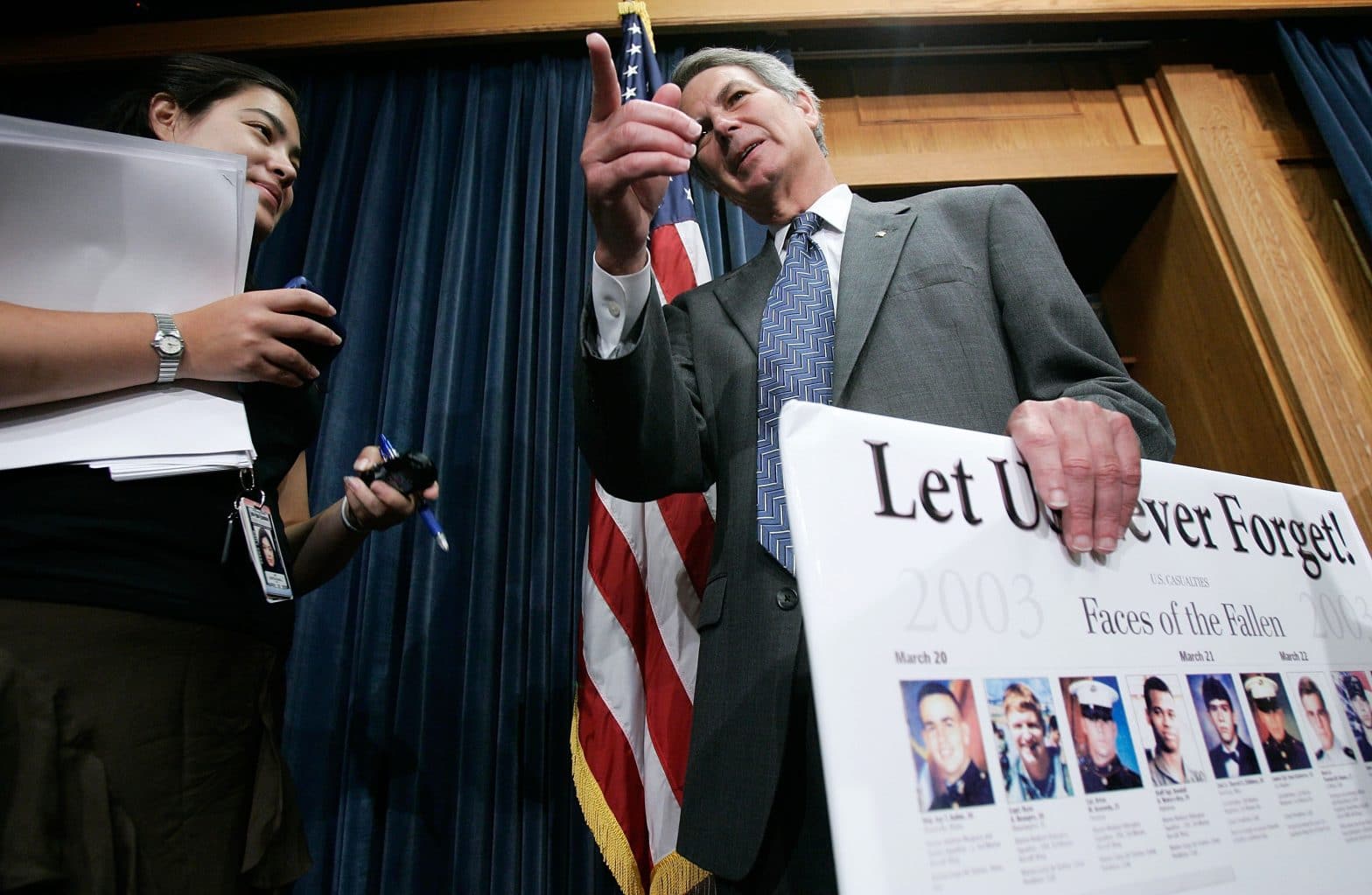The Humanity of Walter Jones

Walter Jones has always been one of my favorite members of Congress, even though I agree with him on almost nothing. I’ve always admired his independence, and his self-fulfilling declaration that he didn’t come to Washington to be a Chairman. It’s been well documented that Walter Jones is his own human. But what I’ll always remember about him the way he recognizes the humanity in others.
I first got to know Walter Jones when, as a junior staffer for then-freshman Congressman Rahm Emanuel, I was assigned to find a way to publicly recognize each of the fallen warriors from the wars in Iraq and Afghanistan. In 2004, this was sadly a more radical proposal than it might sound, as the wars were rarely discussed on the House floor, and even then only in abstract and partisan terms. Statistics were thrown around by all sides. But there were no names behind the numbers. No faces. No real connection to those fighting the wars for anyone except for those members and staffers contending with the increasingly frequent pre-notifications of casualties from their district.
But walking the 4th floor of the Cannon Building, I saw that a Congressman from North Carolina was already going beyond the numbers with a simple, silent gesture. Lining the marble hallway were placards, side by side, each displaying 24 pictures, with 24 names, from 24 hometowns. There were dozens of these placards, extending down the hall in each direction, honoring every single one of the then-hundreds of fallen warriors from Operations Enduring Freedom and Iraqi Freedom. It was a display that had to be taken individually, one face at a time, each name an individual tribute. A silent and growing memorial to the individual warriors, and a constant reminder to all who passed by the office of Walter Jones.
My inexperience in the realities of the 108th Congress probably showed as I walked into the office of an R from NC and assumed they would welcome the chance to work with a D from IL. But welcome it they did. I met Glen Downs, Congressman Jones’s Chief of Staff, who immediately offered to share the effort of mounting and continuing the display in front of Congressman Emanuel’s Longworth Office to mirror the one in Cannon.
Congressmen Jones and Emanuel’s joint effort would grow to include regular bipartisan readings of the names and ranks of the fallen on the House floor, so that every Marine, Soldier, Sailor, Airman, Coastguardsman and Civilian would have their brief moment of silence and remembrance on the floor of the people’s house. Walter Jones was there for every name. And when House leadership tried to demand that our displays be taken down, our offices worked together to make the names a permanent fixture of the Rayburn Lobby.
It wasn’t until years later that I found out that Congressman Jones was also writing individual letters of condolence to each of the gold star families. Some have portrayed this as an act of penance by the man who coined “freedom fries” and later turned against the war. But I don’t think that captures the story at all. Walter Jones would have done the same thing if his faith in the war had remained unshaken. And he would have done it for a conflict he’d opposed all along. He simply saw the individuals behind the numbers. He saw their families. And he did what he could to help.
My last encounter with Walter Jones was on a walk through the tunnel from Cannon to the Capitol. I was a senior staffer by then, working for another independent spirit in the North Carolina delegation. And as Members rushed by on their way to vote, Walter Jones recognized me and engaged me in conversation. I don’t remember what we talked about but I remember our conversation seemed to end when one of the highest ranking Republicans in the nation cut in and asked Congressman Jones a question. But Walter Jones waved off that senior Republican so he could take one last moment to shake my hand and say, “God bless you, Sean.”
Spend a minute in Washington and you can find a thousand reasons to dismiss such a gesture. Remembering and redeploying someone’s first name is a well-worn political party trick. Ending a conversation with a blessing is probably standard fare for a man whose constituency is largely evangelical. Even cutting off a member of leadership to talk to a lowly staffer could be seen as an assertion of independence or a stalling tactic against pressure on the upcoming vote.
But I know it was none of those things. He meant every word of it. Because I know what drives Walter Jones. It’s the common thread that drove him to create that hallway display. To write all of those letters. To shake a young Democrat’s hand. He sees the individual. He recognizes the humanity. And he takes the time to honor it.
So it hit me particularly hard to hear that Congressman Jones had been moved to hospice care. His presence on the House floor will be missed whenever too many members fall in line and obey the rules. I hope he is still stirring up trouble somewhere, and that he and his family are in comfort and peace. And if he’s reading this, I hope he’ll accept a return handshake, and understand that I mean every word of it when I say, “God bless you too, Walter.”
—
Sean O’Brien is an Adjunct Professor at Georgetown University’s McCourt School of Public Policy. He has served under both Democratic and Republican administrations in the Pentagon, the White House and the House of Representatives. Follow him on twitter at @hope_history.
























